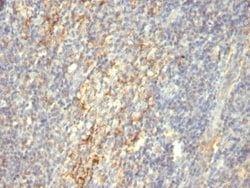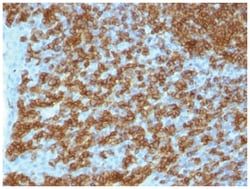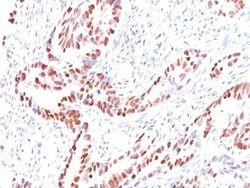Transglutaminase 2/TGM2 Antibody (SPM358), Novus Biologicals™
Manufacturer: Fischer Scientific
Select a Size
| Pack Size | SKU | Availability | Price |
|---|---|---|---|
| Each of 1 | NBP24459500-Each-of-1 | In Stock | ₹ 23,852.00 |
NBP24459500 - Each of 1
In Stock
Quantity
1
Base Price: ₹ 23,852.00
GST (18%): ₹ 4,293.36
Total Price: ₹ 28,145.36
Antigen
Transglutaminase 2/TGM2
Classification
Monoclonal
Concentration
0.2mg/mL
Dilution
Flow Cytometry 0.5 - 1 ug/million cells in 0.1 ml, Immunohistochemistry-Paraffin 0.5 - 1.0 ug/ml, Immunofluorescence 0.5 - 1.0 ug/ml
Gene Accession No.
P21980
Gene Symbols
TGM2
Immunogen
Recombinant full-length human TGM2 protein
Quantity
0.02 mg
Research Discipline
Apoptosis, Immune System Diseases, Immunology, Signal Transduction
Gene ID (Entrez)
7052
Target Species
Human, Mouse, Rat, Monkey, Rabbit
Form
Purified
Applications
Flow Cytometry, Immunohistochemistry (Paraffin), Immunofluorescence
Clone
SPM592
Conjugate
Unconjugated
Formulation
10mM PBS and 0.05% BSA with 0.05% Sodium Azide
Gene Alias
C polypeptide, EC 2.3.2.13, G-ALPHA-h, protein-glutamine gamma-glutamyltransferase 2, protein-glutamine-gamma-glutamyltransferase, TG(C), TG2, TGase C, TGase H, TGase-2, TGase-H, TGCGNAH, Tissue transglutaminase, transglutaminase 2 (C polypeptide, protein-glutamine-gamma-glutamyltransferase), Transglutaminase C, Transglutaminase H, Transglutaminase-2
Host Species
Mouse
Purification Method
Protein A or G purified
Regulatory Status
RUO
Primary or Secondary
Primary
Test Specificity
Recognizes a 77-85kDa protein, identified as cellular or tissue transglutaminase II (TGase II). Transglutaminases are enzymes that catalyze the crosslinking of proteins by epsilon-gamma glutamyl lysine isopeptide bonds. While the primary structure of transglutaminases is not conserved, they all have the same amino acid sequence at their active sites and their activity is calcium-dependent. The protein encoded by this gene acts as a monomer, is induced by retinoic acid, and appears to be involved in apoptosis. Finally, the encoded protein is the autoantigen implicated in celiac disease. The identification of transglutaminase as the main antigen of endomysium antibodies allows a new diagnostic approach to celiac disease (CD), a genetic, immunologically mediated small bowel enteropathy that causes malabsorption. TGase II is implicated in programmed cell death, signal transduction, drug-resistance, cell growth, endocytosis, insulin secretion, cell adhesion, cataract formation, and wound he
Content And Storage
Store at 4C.
Isotype
IgG2a κ
Description
- Ensure accurate, reproducible results in Flow Cytometry, Immunohistochemistry (Paraffin), Immunofluorescence Transglutaminase 2/TGM2 Monoclonal specifically detects Transglutaminase 2/TGM2 in Human, Mouse, Rat, Monkey, Rabbit samples
- It is validated for Flow Cytometry, Immunohistochemistry, Immunocytochemistry/Immunofluorescence, Immunohistochemistry-Paraffin.




